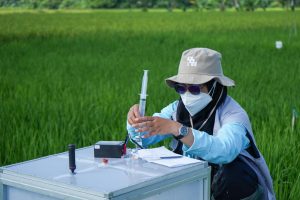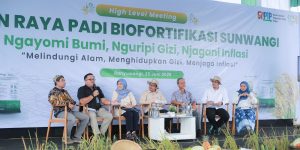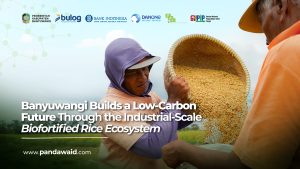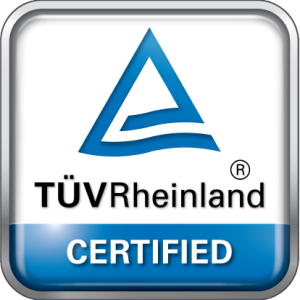Amid the climate crisis, the Industrial-Scale Biofortified Rice Ecosystem in Banyuwangi is taking real action toward a healthier, low-emission, and collaboration-driven future for agriculture.
Feeding the Future: Sustainable Ecosystems for Indonesia Emas 2045
Food security and nutrition fulfillment are top priorities in Indonesia’s national development agenda. In the draft of the 2025–2029 National Medium-Term Development Plan (RPJMN), the second national priority underscores the country’s commitment to ‘strengthening national defense and security systems and promoting national self-sufficiency through food, energy, and water sovereignty, as well as the development of the creative economy, green economy, and blue economy.
Progress toward food self-sufficiency continues to show promising results. As of May 18, 2025, BULOG recorded a national rice stock of 3.8 million tons, the highest level since the agency was established in 1969.
However, on the upstream side, rice cultivation still faces major challenges. According to data from Low Carbon Development Indonesia, rice farming contributes 11% of total greenhouse gas (GHG) emissions from the national agriculture sector. This highlights the need for a balanced approach strengthening downstream supply chains while transforming upstream production processes to achieve a truly sustainable food system.

Building an Inclusive and Low-Carbon Industrial-Scale Biofortified Rice Ecosystem
In response to these challenges, Banyuwangi has introduced a new model for developing regional food systems. Through the Industrial-Scale Biofortified Rice Ecosystem, the region is pioneering Indonesia’s first initiative that integrates three core pillars of sustainable food ecosystem development:
- Scaling up biofortified rice production through environmentally friendly technologies
- Implementing low-carbon farming practices at the smallholder level
- Strengthening multi-stakeholder (Pentahelix) collaboration across the entire value chain
This initiative was previously known as the Sunwangi Ecosystem, representing the initial phase of development rooted in local collaboration. Over time, as its positive impacts became evident, the ecosystem evolved into an industrial-scale model aimed at reaching more farmers, strengthening nutritional resilience, and expanding its benefits on a national level.
This ecosystem brings together a diverse range of stakeholders: farmers, academia (IPB University), private sector (PT Terra Agro Yields), a national offtaker (Bulog), the private sector (Danone Indonesia), and Bank Indonesia.
Through this cross-sector collaboration, Banyuwangi is not only strengthening agricultural production capacity but also ensuring that the resulting products deliver direct benefits to the community. One example is Sunwangi, a nutrient-rich biofortified rice that supports both nutritional resilience and the national health agenda..

Low-Carbon Farming Practices in the Industrial-Scale Biofortified Rice Ecosystem in Banyuwangi
On the upstream side, the key to sustaining the Industrial-Scale Biofortified Rice Ecosystem in Banyuwangi lies in the selection of biofortified rice seeds, the implementation of PPAI Technology, and the measurement of total emissions generated throughout the cultivation process.
Currently, the ecosystem utilizes biofortified rice varieties 9G and 15S, developed by Prof. Dr. Ir. Hajrial Aswidinnoor, M.Sc., (Professor at IPB University) and his team. These varieties are resistant to Brown Planthopper (WBC) attacks, offer competitive productivity compared to other superior varieties, and are adaptable to both dry and wetland conditions. In addition, their higher iron (Fe) and zinc (Zn) content contributes to efforts in reducing anemia and stunting. Moving forward, the Industrial-Scale Biofortified Rice Ecosystem in Banyuwangi remains open to adopting other rice varieties that offer new innovations and advantages.
Throughout the cultivation process, farmers are supported in applying regenerative agricultural practices through PPAI Technology® (Plant and Soil Health, Productivity, Assistance, and Innovation). This technology involves 10 key interventions ranging from land preparation and planting to harvest based on the principle of sustainably increasing productivity without excessive reliance on chemical inputs.
Several key interventions implemented include:
- Use of Pesticide Reductants, enabling up to a 50% reduction in synthetic pesticide use.
- Alternate Wetting and Drying (AWD) method, an intermittent irrigation system that reduces waterlogging and methane emissions in rice fields.
- Utilization of Straw Decomposers, which prevents open field burning of straw while enriching the soil with organic matter.
- Application of Balance Solution, a biochar based soil amendment that improves soil structure and reduces crop dependency on chemical fertilizers.
Each practice is applied in a site-specific manner, tailored to the unique needs of each plot and farmer’s conditions, ensuring optimal impact on both productivity and the environment
To ensure the effectiveness of these practices in reducing carbon emissions, regular monitoring and measurement of greenhouse gases (GHG) are carried out through a collaboration between IPB University, PT Terra Agro Yields, and Danone Indonesia.

Initial Impact and Development Plan of the Industrial-Scale Biofortified Rice Ecosystem in Banyuwangi
The initial planting season of the Industrial-Scale Biofortified Rice Ecosystem in Banyuwangi began on 5 hectares of land and has now progressed to a second season covering 24 hectares. Given its promising potential, the ecosystem is planned to expand to 500 hectares by 2026, with an estimated harvest of up to 1,250 tons of biofortified rice
Throughout the cultivation process, the low-carbon and regenerative farming approach implemented through PPAI Technology has successfully:
- Reduced synthetic pesticide use by up to 50%,
- Improved water use efficiency by up to 213%,
- Created 483 job opportunities,
- Increased access to biofortified rice for over 2,000 women and children, and
- Prevented the release of 172 tCO₂e into the atmosphere equivalent to the emissions from driving a car for more than 636,400 kilometers.
These results send a strong signal that Banyuwangi is shaping the future of agriculture healthy, environmentally friendly, and inclusive. This ecosystem stands as an inspiring model for other regions aiming to develop productive and sustainable food systems through multi-stakeholder collaboration.
Banyuwangi as an Inspirational Model for Sustainable Food Development
Through the development of the Industrial-Scale Biofortified Rice Ecosystem, Banyuwangi is contributing not only to strengthening national food security but also demonstrating that the transition toward low-carbon agriculture can be achieved through a collaborative pentahelix approach.
This early success opens the door for replication in other regions, aligning with the Golden Indonesia 2045 vision and the country’s commitment to sustainable development.
The ecosystem proves that when technological innovation, regenerative practices, and multi-stakeholder collaboration come together, transforming the agricultural sector into one that is healthier, more inclusive, and low-emission is no longer just an ideal, it is an attainable reality.








